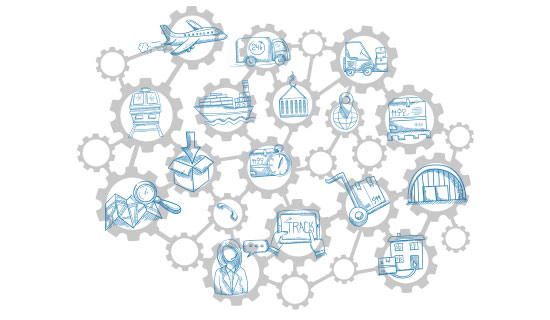The Blurred Line Between Logistics and Technology Services
One of the trends within Supply Chain Management according to Aber Logistics is that there is no line anymore between Logistics an Technology services. We already see some large companies launch their own digital platform and others orientating what to do. What’s the impact/implication to your company, should you join a platform or create one yourself? At Aber Logistics we also strongly believe in the digitization of logistics. We will be launching a visibility platform soon where we integrate the full range of data from customers and their suppliers. This data will be an asset in KPI & target setting, but will most importantly allow proactive monitoring of business processes.
Spinn off from B2C market
The coming years we will surely see logistics companies become increasingly hard to distinguish from technology providers, as 3PLs and 4PLs continue to leverage IT platforms as major service-selling points.
To some extent, this blurring of the line is spinning off from a similar phenomenon in the consumer markets, where sometimes it’s hard to know if you’re dealing with a business entity or a software platform. For example, when you book an accommodation on AirBnB, do you think of yourself as:
a) Making a purchase from a travel-oriented service provider?
or…
b) Connecting with an independent seller through a sales-oriented social media platform?
When you book an Uber driver to take you downtown, are you using an app to find you a private “taxi” or are you making an online purchase from a transport provider?
This apparent blending of technology and service provision into a “singularity” is beginning to pervade B2B marketplaces, especially those related to logistics services. For instance:
American companies needing short-term warehouse space can log into FLEXE and get connected to other companies with floor or rack space to spare. Later this year a similar platform will be launched in The Netherlands, more information on that still to follow.
The concept of the logistics “control tower” is increasingly becoming synonymous with both supply chain management software solutions and outsourced logistics service providers
The same melding of software and service can be found in solutions used for warehouse management, procurement/purchasing, and other operational applications in the supply chain, as on-premises software gives way to cloud solutions with integrated technical support services and self-help capabilities which obviate the need for in-house IT resources.
What does this trend mean for your company?
In itself the blurry line creates little issue, apart from some semantic frustrations. What it does mean however, is that you will need to be increasingly cautious about what kind of organisation you are dealing with when procuring services and solutions.
I say this because undoubtedly, as technology and supply chain expertise continue to consolidate within logistics applications, upstart providers will have more strength in terms of technology than supply chain knowledge, or vice versa.
This will be an important consideration when taking advantage of such solutions, since selection criteria will need to take into account your own business’ strengths and weaknesses and how those of a given vendor/service provider will complement them.
Other factors to evaluate may include:
• How might use of transport solutions affect your place in the chain of responsibility?
• Will use of a particular service/platform improve or hamper flexibility in your supply chain?
• Can you ensure/maintain your company’s customer service promise when using third-party platforms?
As new integrated supply chain platforms come online, which they surely will in 2017-2018, it will be tempting to jump onboard, especially given their accessibility (just sign up and go), but it’s important to keep an eye on the wider implications which in many cases, will not have been tested greatly in the use of new service models.
Contact us for more information
At Aber Logistics we work with people who have become experts in these Logistic ‘digitization’ processes, please feel free to contact one of our consultants if you wish us to update you on the various options and implications.


